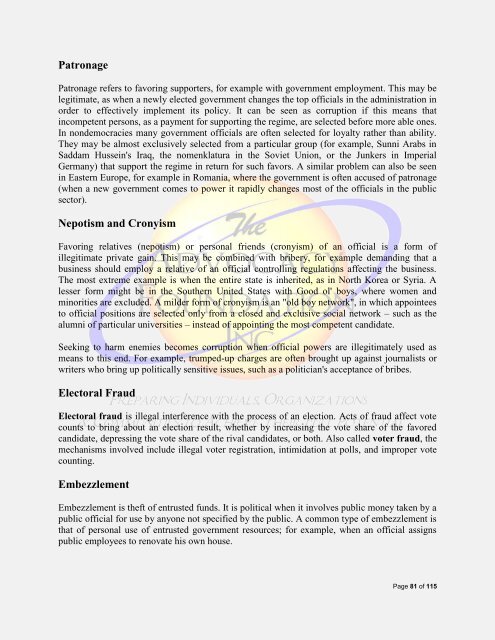Judicial ReEngineering
Judicial ReEngineering
Judicial ReEngineering
Create successful ePaper yourself
Turn your PDF publications into a flip-book with our unique Google optimized e-Paper software.
Patronage<br />
Patronage refers to favoring supporters, for example with government employment. This may be<br />
legitimate, as when a newly elected government changes the top officials in the administration in<br />
order to effectively implement its policy. It can be seen as corruption if this means that<br />
incompetent persons, as a payment for supporting the regime, are selected before more able ones.<br />
In nondemocracies many government officials are often selected for loyalty rather than ability.<br />
They may be almost exclusively selected from a particular group (for example, Sunni Arabs in<br />
Saddam Hussein's Iraq, the nomenklatura in the Soviet Union, or the Junkers in Imperial<br />
Germany) that support the regime in return for such favors. A similar problem can also be seen<br />
in Eastern Europe, for example in Romania, where the government is often accused of patronage<br />
(when a new government comes to power it rapidly changes most of the officials in the public<br />
sector).<br />
Nepotism and Cronyism<br />
Favoring relatives (nepotism) or personal friends (cronyism) of an official is a form of<br />
illegitimate private gain. This may be combined with bribery, for example demanding that a<br />
business should employ a relative of an official controlling regulations affecting the business.<br />
The most extreme example is when the entire state is inherited, as in North Korea or Syria. A<br />
lesser form might be in the Southern United States with Good ol' boys, where women and<br />
minorities are excluded. A milder form of cronyism is an "old boy network", in which appointees<br />
to official positions are selected only from a closed and exclusive social network – such as the<br />
alumni of particular universities – instead of appointing the most competent candidate.<br />
Seeking to harm enemies becomes corruption when official powers are illegitimately used as<br />
means to this end. For example, trumped-up charges are often brought up against journalists or<br />
writers who bring up politically sensitive issues, such as a politician's acceptance of bribes.<br />
Electoral Fraud<br />
Electoral fraud is illegal interference with the process of an election. Acts of fraud affect vote<br />
counts to bring about an election result, whether by increasing the vote share of the favored<br />
candidate, depressing the vote share of the rival candidates, or both. Also called voter fraud, the<br />
mechanisms involved include illegal voter registration, intimidation at polls, and improper vote<br />
counting.<br />
Embezzlement<br />
Embezzlement is theft of entrusted funds. It is political when it involves public money taken by a<br />
public official for use by anyone not specified by the public. A common type of embezzlement is<br />
that of personal use of entrusted government resources; for example, when an official assigns<br />
public employees to renovate his own house.<br />
Page 81 of 115

















